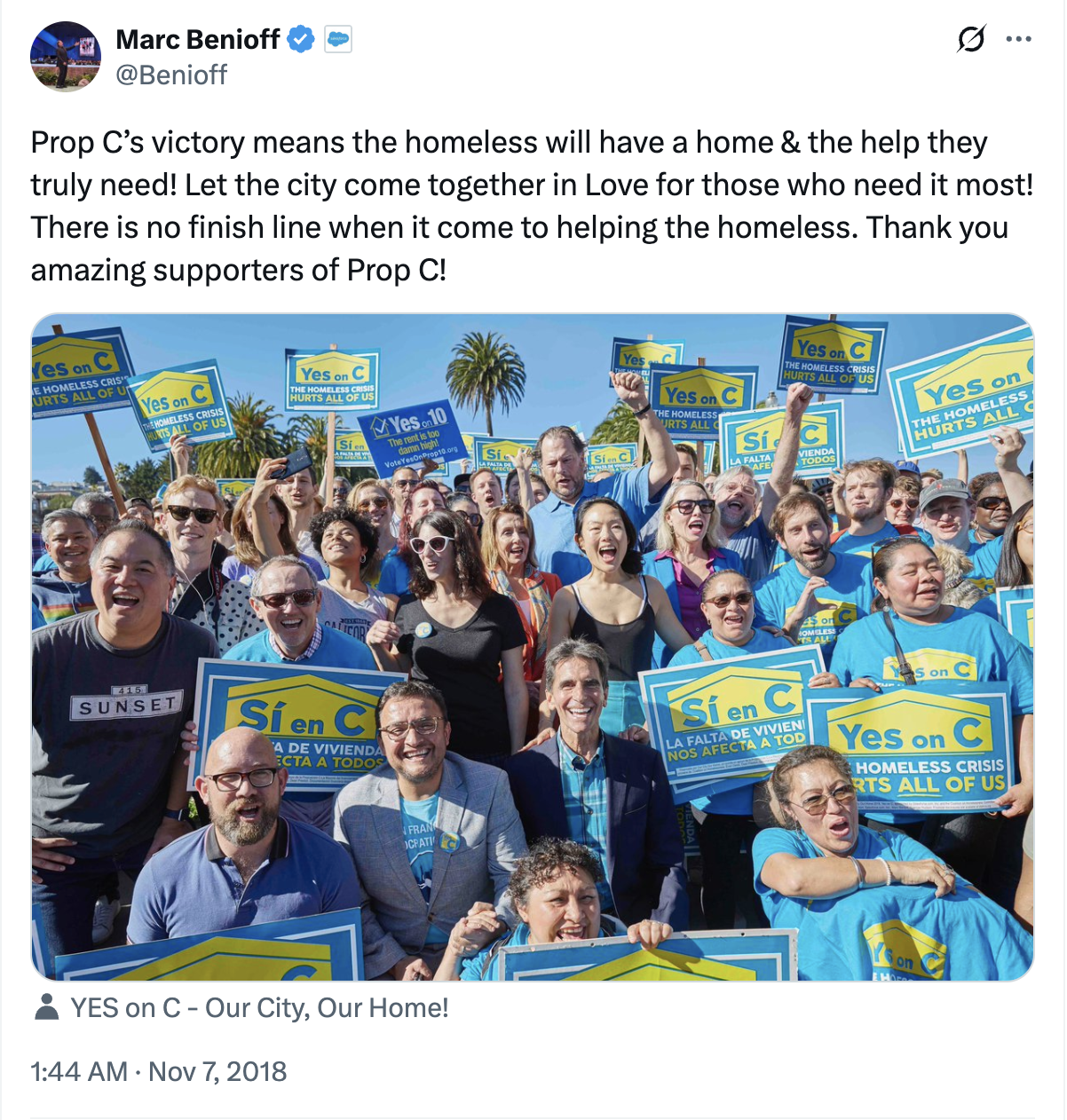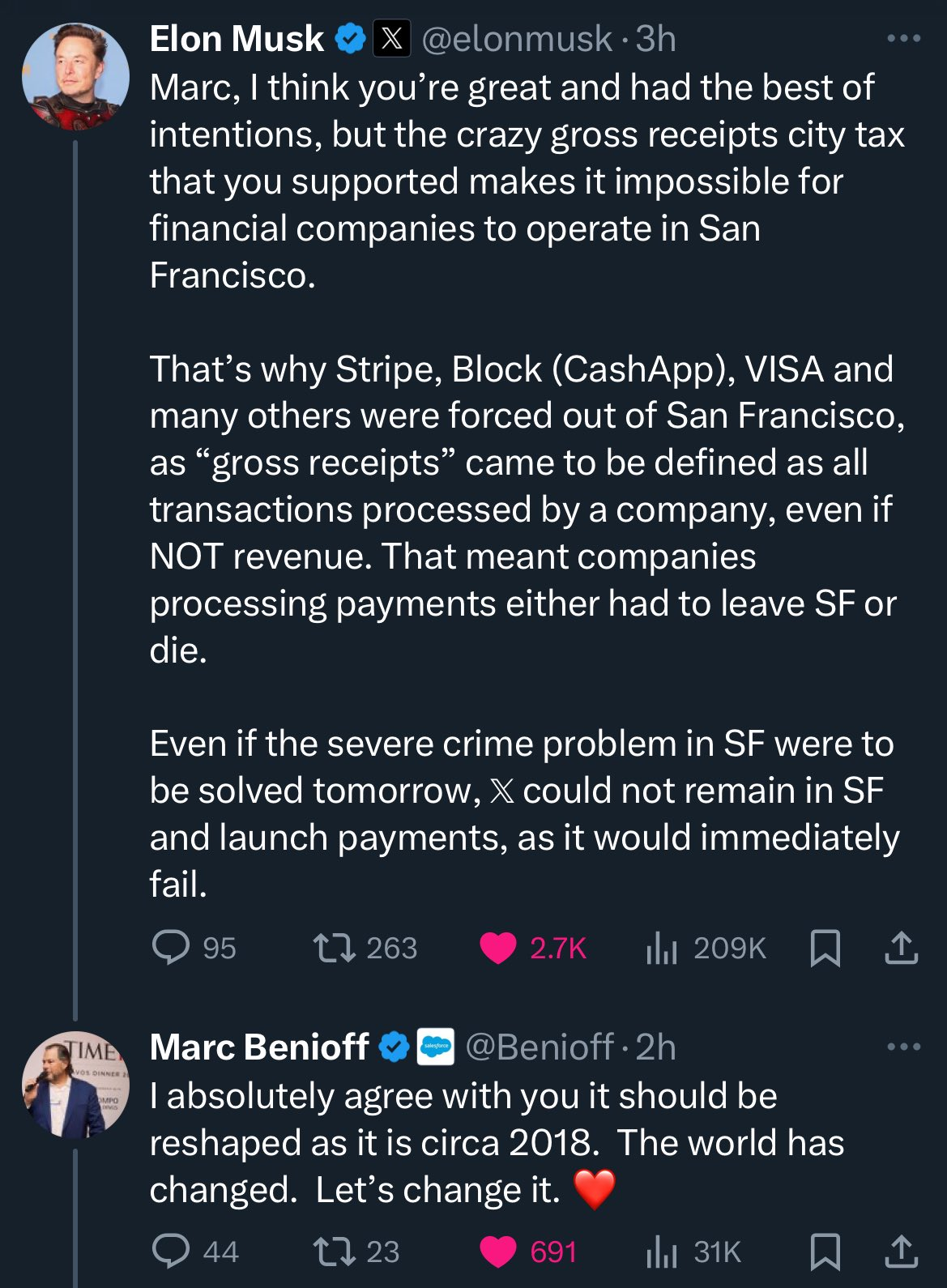
Doom LoopSep 1
pirate wires #104 // looking back on proposition c, tech's san francisco turning point, "doom loop" analysis, a well-paved path to eternal homelessness, and how to solve the crisis
Oct 16, 2025

So — shall we send in the troops?
Thick amidst the constant swirl of Californian Clown World chaos, tired now from years of dwindling state capacity and endemic crime across the Golden State, it was only natural desperate Americans would find themselves wondering if Daddy Trump could finally just do something about the ongoing west coast circus. One such desperate American? Salesforce CEO and former libtard darling Marc Benioff, who praised Trump last week, and then kindly requested the National Guard be delivered to the Tenderloin.
“We don’t have enough cops,” said Benioff of the President’s suggestion he might send troops to San Francisco, “so if they can be cops, I’m all for it.”
But as much as the thought of jacked Marines kicking in the teeth of fentanyl dealers while blue-haired baristas seethe and cry in the streets with their cameras out warms my heart, federal intervention in local law enforcement is generally not a good idea without some very dangerous and immediate threat to the country, and a silly path for anyone in tech to take. In the first place, this is a super nebulous legal gray area.
Since 1878, with updates in 1956, 1981, and 2021, the Posse Comitatus Act has limited the federal military’s ability to enforce domestic law, excluding the Army, the Air Force, the Navy, the Marines, and the Space Force (lol let’s go) from cracking skulls throughout the homeland. The Coast Guard isn’t covered by the law, and if a state governor invites the National Guard or the Air National Guard in for assistance, the federal government is permitted to help. But without that explicit request, the clearest path for a president to send troops into a state is the Insurrection Act.
Now, invoking the Insurrection Act is not actually as uncommon as the Trump deranged would have you believe. There have been 30 invocations since 1808, with the last in 1992, when George Bush senior sent troops into Los Angeles to put down the Rodney King riots. But to the immediate question of San Francisco, what is the justification?
Trump’s law enforcement in D.C., despite all panicked screeching from the pro-crime left, is unambiguously legal. Our nation’s capital is not a state, and our president controls D.C.’s National Guard. While the Insurrection Act has not yet been formally invoked in Chicago, it is clearly justifiable given the work of federal authorities has been made impossible by local violence, which has arguably been incited on purpose by the local government. Even still, Trump’s actions in the city have been challenged in court, and will now work their way through our legal system.
But in San Francisco, where exactly is the crisis, or what federal work is now impossible? Yes, the Tenderloin is gross and dangerous. Yes, the fact that our city won’t work with ICE to deport Honduran nationals dealing fentanyl is infuriating. But roughing up a bunch of drug addicts and low-life criminals pretty obviously constitutes rudimentary policing, rather than an essential federal response to some extreme and unusual circumstance, and does not at all seem to be what the Insurrection Act is for. Then, it’s legality is also not the reason I am most wary of its invocation.
A brief period of law enforcement under Trump will not save San Francisco. And let’s be honest with ourselves, saving San Francisco is not Trump’s goal. The president sees the city not only as a hub of left-wing idiocy (fair), but as an important symbol of the Democratic Party’s gross incompetence (okay, also fair). “Fixing” the city Democrats couldn’t, or wouldn’t, would be very attractive to Trump’s base, and no matter what he does I’m sure his actions will be framed as a victory on Fox. But let’s just say there is a victory. Let’s say, for argument’s sake, the drug dealing plummets, and the thieving plummets further. Will federal troops stand on Market Street forever? Or will they be gone in a few months?
A year from Trump taking action, without a doubt, the city will be back to a state of de-facto legalized crime. This isn’t because Mayor Lurie or the city’s DA are uninterested in policing. This is because our local courts are filled with pro-crime judges who refuse to remove violent monsters from our streets, even after they’re arrested. And a year after Trump’s intervention, honestly, I think the city might be even worse.
Trump’s entrance into San Francisco local politics will galvanize the leftists who ran this city for the past several decades. The Chesa Boudins of the world are presently demoralized and out of power. But the Chesa Boudins of the world have always run against a fictional version of a fascist, over-policed America. Federal troops in the city, against the city’s will, starts to tell a story men like Boudin can work with, and local politicians from the furthest extremes of the left will no longer be made to answer for their actually dystopian records. They’ll only have to run against Trump in a city that voted overwhelmingly against him. This will be a nightmare for the city’s moderates.
My sense is Mayor Lurie, a center-left liberal, understands this, which is why he canceled a recent event with Benioff. San Francisco is finally on a slow healing trajectory, making incremental progress back towards sanity for the first time in years. Throwing Trump into our local politics like a Molotov cocktail will not revive the city. There is only one thing that can do that: an influx of good men, great companies, and smartly-allocated money. In other words, roughly the opposite outcome of Benioff’s last big foray into local politics, which is perhaps why he’s performatively overcompensating now. What, does he think we don’t remember?
I remember, bitch.
Back in 2018, to wild applause from the tech-loathing left-wing press, Benioff championed Prop C as our path to end San Francisco’s homeless crisis, ushering in an enormous new tax on gross receipts for individuals and businesses with more than $50 million in revenue. Critically, the tax was assessed on gross income rather than profit, which disproportionately targeted payment processing companies like Stripe and Square with higher transaction volume and thinner margins.
Both Jack Dorsey and Patrick Collison attempted to explain in public that this would make their business in the city impossible, but this was years before new media press outlets existed to challenge the left’s monopoly over public discourse. Benioff accused the founders of simply not giving a shit about the homeless, both Patrick’s and Jack’s reputations were torched, every press outlet that covered the story championed the tax, and in a city that liked the sound of “help the homeless, eat the rich,” Benioff — a big ol’ fellow billionaire far less impacted by the tax himself — was victorious.

Amazing, our homeless have a home now, I learned today. Well, I guess Benioff did at least say there’s “no finish line” after insisting Prop C would solve the crisis. In any case, so far as the man — we begrudgingly admit — also represents the industry, it was a pyrrhic victory for tech.
A couple years ago, I wrote the full story for Pirate Wires in a piece called Doom Loop:
Both Benioff and his detractors made a lot of claims in 2018, but their central claim was just the city only had a homeless problem because it didn’t have enough money. It was always obvious that Benioff was wrong, as the city already had something like $300 million a year set aside for the several thousand chronically homeless roaming the streets at the time. Providing beds and food somewhere safe and far outside the downtown drug market would not have been difficult. Our problem wasn’t money. Our problem was our city had no plan to actually solve homelessness. But we did have a lot of NGOs run by left-wing activists to feed.
Today, San Francisco’s annual budget for addressing homelessness is close to $1 billion a year. Square and Stripe have left the city. And homelessness has increased.
Earlier this week, as the question of Benioff’s responsibility here was once again litigated on social media, both Elon Musk and Jack Dorsey confirmed the long-term chilling effect Prop C has had on business in the city. We have never recovered from the policy.
Marc evolved his thinking over the years, and a year ago had this to say in public:

These are nice words. Words are not enough.
Benioff has still not led the charge to reverse the very significant damage he did to San Francisco in an effort to please the likes of, for example, the ancient anti-tech blueanon goblin Kara Swisher, who he credits with radicalizing him on the issue, and who herself has had rather less to say about the policy’s massive, historic failure. I heard she lives in Washington D.C., now, and assume she doesn’t think much about the city she helped cripple any longer.
In a way, sure, we do need troops in San Francisco. A rising population of good men with good values generating business. But the federal government is neither interested in nor capable of giving that to the city. We have to generate these things ourselves, and that starts with some honest reflection on the policies we’ve supported over the years, with some assessment of how they’ve done. Prop C is a policy that can’t be defended, and has arguably done more damage to the city than our lunatic judges.
My sense is Benioff wants us all to memory-hole his past disastrous political activism, and certainly he has a mixed record. The man has done plenty of good for the city. Dreamforce is a great local boon, and his recent $15 billion local investment commitment isn’t nothing. But there really can’t be any forgiveness for what he did until he publicly apologizes for Prop C, publicly apologizes to Jack Dorsey and Patrick Collison, and pours millions of dollars into a new campaign to repeal the proposition that helped trigger the city’s doom loop. Anything less is empty rhetoric, and I’ve been over the hoorah “based” posting for months.
Put your money where your mouth is.
-SOLANA